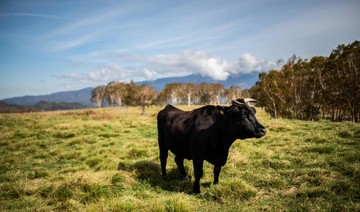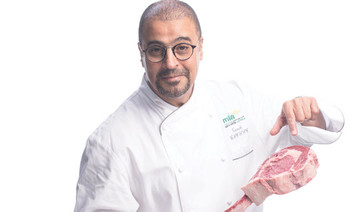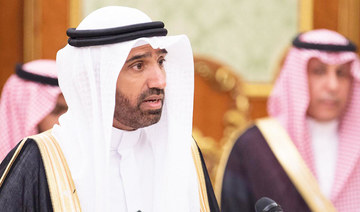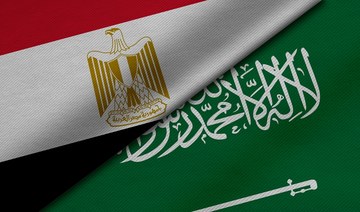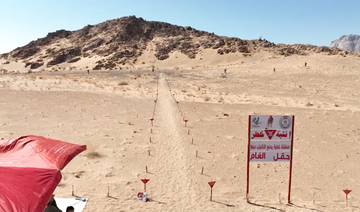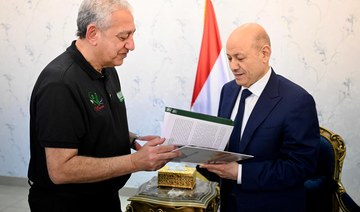A top-level business delegation from Saudi Arabia took part in a five-day trade mission to Spain focusing on the meat industry.
The trip, hosted by the Spanish meat production sector’s Interprofessional Organization of Beef Cattle (Provacuno), followed a reciprocal visit to the Kingdom last year.
Representatives of the Saudi media and meat trade toured farms, feed mills, slaughterhouses, and meat markets in and around the Spanish capital Madrid, to see the latest high-quality, environmentally-friendly beef production methods.
A non-profit organization officially recognized by the Spanish government, Provacuno represents 85 percent of the Spanish beef industry. Established in 1997, it is comprised of national associations working to protect the interests of companies involved in Spain’s meat production, industrial, and commercial sectors.
Saudi Arabia only reopened its market to Spanish beef three years ago after stopping imports in 2001 as a result of the bovine spongiform encephalopathy (BSE, or mad cow disease) outbreak.
With the Kingdom being one of the highest meat-consuming nations in the world, Provacuno sees it as a key target market. In 2017 Spanish beef exports to Saudi Arabia were valued at €680,000 ($768,000). In the same year, the Kingdom produced 60,000 tons of meat while consuming over 220,000 tons. Brazil, India, Australia and Pakistan currently dominate the beef imports market to Saudi.
However, Provacuno hopes to step up its trade links with the Kingdom and has embarked on a three-year promotional tour showcasing Spain’s beef industry in not only Saudi Arabia, but other countries including the UAE, Vietnam, and Hong Kong.
During a presentation to the Saudi delegation at Provacuno’s headquarters in Madrid, its market research and training manager, Alvaro Espejo León, explained to Arab News the organization’s market strategy for the Kingdom.
“While Brazil and India control most of the Saudi beef market, we do not share the same market strategy as them,” León said. “They are focused on a different target market. They don’t represent our segment or our target client. Our strategy is not aimed towards restaurants, but rather five-star hotels and supermarkets like Danube and Manuel.”
Provacuno representatives visited the Kingdom in November last year as part of their promotional campaign “What a Wonderful European Beef,” which concluded at Jeddah’s Foodex.
On the return leg to Spain, the Saudi trade delegates spent their first day touring fattening farms and feed mills in the cities of Lleida and Huesca. Provacuno’s cuts of meat are categorized based on breed of cattle and age of slaughter.
At the Agropienso feed manufacturing plant in Huesca, the Saudi party was shown how cattle are fed grain with a high-grade nutritional value cereal and oil-seed.
With the goal of enhancing the Spanish beef industry’s image through sustainable and environmentally-friendly production processes, Provacuno maintains a firm compliance with strict European production requirements on food safety standards. Tough rules surrounding animal welfare, hygiene control, and environmental protection also cater for international markets like Saudi Arabia by offering meat that is 100 percent halal certified.
The Spanish hosts also introduced their Saudi guests to the Almameat group, which encompasses livestock production, slaughterhouses, and cutting plants all operating with the latest technology. Almameat has over 500 cattle breeders, and a weekly meat production capacity estimated at more than 1,000 tons. Its modern cooling facilities can hold up to 2,500 cow and sheep carcasses daily.
A visit to the giant Mercamadrid meat market gave the Saudi delegation a glimpse into the final commercialized phase of beef production – buying, selling, and trade.
Mercamadrid is the largest perishable foods market in Europe with a total area of more than 220 hectares. It houses over 900 independent firms and provides food for 12 million consumers living within a 500 km radius.
With the risk of BSE now officially considered negligible in Spain, Provacuno has been experiencing an upward trend in exports of meat products in recent years. Provacuno’s annual meat production exceeds 650,000 metric tons. It has more than 110,000 farms, with industry exports amounting to 175,000 metric tons annually. For the past 20 years, the organization has been officially recognized by the Spanish Ministry of Agriculture, Fisheries and Food, as an agro-food interprofessional body.
According to UN trade figures, beef consumption in Saudi Arabia has increased steadily in recent years after a consecutive decreasing trend between 2012 and 2016. Currently, the EU is the second-largest annual producer of beef in the world at more than 8 million metric tons. Spain’s main beef exports are to Turkey, Hong Kong, Israel, Lebanon, and Ghana.
Spanish meat industry chiefs host Saudi trade mission
Spanish meat industry chiefs host Saudi trade mission
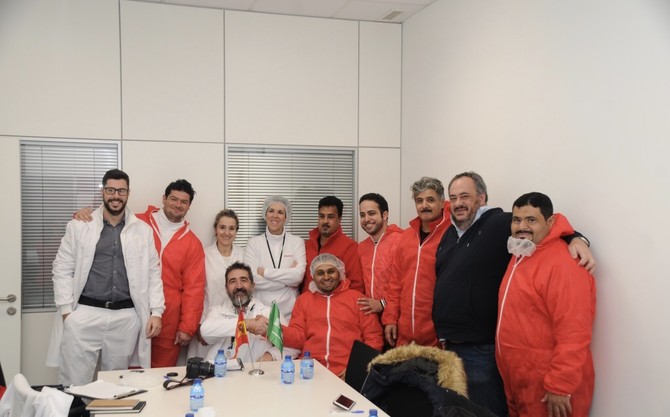
- With the Kingdom being one of the highest meat-consuming nations in the world, Provacuno sees it as a key target market.
Saudi FM leads Gaza committee urging sanctions on Israel
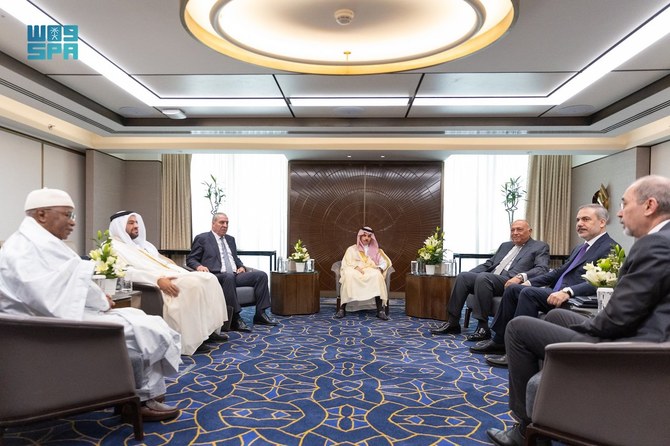
- Ministers also addressed the repression faced by peaceful demonstrators in Western nations who advocate for an end to the conflict in Gaza
RIYADH: Ministers gathering in Riyadh to discuss the Israeli war on the Gaza Strip stressed the urgent need for imposing sanctions on Israel, the Saudi Press Agency reported Sunday.
Chaired by Saudi Foreign Minister Faisal bin Farhan, the meeting comprising dignitaries from a group formed jointly by the Organization of Islamic Cooperation (OIC) and Arab League convened to address developments in Gaza.
The ministers called for international legal mechanisms to hold Israeli officials accountable, alongside decisive action against settler terrorism.
The officials from Jordan, Egypt, Turkey, Palestine, Qatar and the OIC advocated for halting arms exports in response to Israel's violations of international law and war crimes in Gaza and the occupied West Bank.
It was strongly asserted during the meeting that the Gaza Strip constitutes an inseparable part of the occupied Palestinian territory, rejecting any attempts to displace the Palestinian population from their homeland or to carry out military operations within the city of Rafah.
Ministers also addressed the repression faced by peaceful demonstrators in Western nations who advocate for an end to the conflict in Gaza and condemn Israeli violations against Palestinians.
The meeting also focused on enhancing joint Arab and Islamic efforts to achieve an immediate cessation of hostilities in Gaza, with a priority on safeguarding civilian lives and ensuring the consistent delivery of humanitarian aid.
There was a commitment to persist in international endeavors aimed at recognizing an independent Palestinian state. This included the endorsement of a two-state solution, with East Jerusalem as its capital within the borders of June 4, 1967, in alignment with relevant international resolutions.
Saudi deputy minister attends 50th Arab Labor Conference
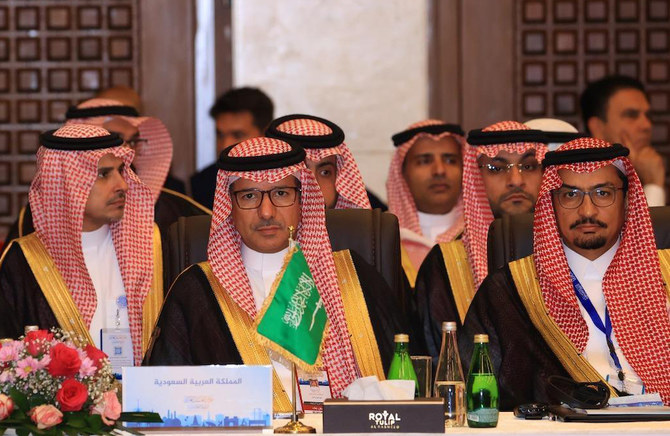
RIYADH: Saudi Deputy Minister of Human Resources and Social Development for Labor, Abdullah bin Nasser Abu Thanin, led the Saudi delegation at the 50th session of the Arab Labor Conference, being held from April 27 to May 4 in Baghdad.
Labor ministers, heads and members of delegations from employers’ organizations, and labor unions from 21 Arab countries, along with representatives from the Arab League and other Arab and international organizations, are attending the conference.
The opening session of the conference included the Iraqi Prime Minister, Mohammed Shia Al-Sudani; Arab League Secretary-General, Ahmed Aboul Gheit; and Director General of the International Labor Organization, Gilbert Houngbo.
During the plenary session of the conference, Abu Thanin delivered a speech in which he emphasized the importance of early qualification and training to meet the labor market’s needs, highlighting technical, personal, and social skills as well as modern work patterns.
Abu Thanin also highlighted the Kingdom’s significant commitment to investing in and developing human resources through the Vision 2030 programs and labor market strategy, along with its various initiatives.
He also pointed out the ministry’s initiative in holding the Global Labor Market Conference in partnership with the International Labor Organization and the World Bank, with the participation of a group of international experts and specialists with the aim of setting plans for future changes in the labor market.
The conference participants are expected to discuss several issues and reports, including the arrangement and coordination of Arab participation in the activities of the upcoming International Labor Conference organized by the International Labor Organization, scheduled to be held in Geneva.
The Arab Labor Organization is one of the organizations of the Arab League, established in 1965. It is considered the first specialized Arab organization concerned with labor and workers’ affairs at the level of the Arab world.
Saudi project clears 797 Houthi mines in Yemen
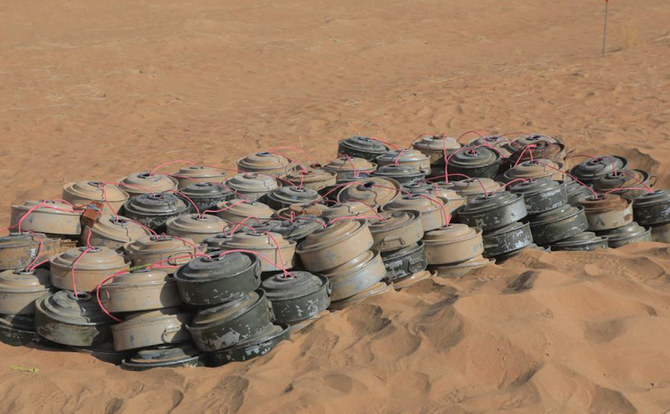
RIYADH: Saudi Arabia’s Project Masam cleared 797 mines in Yemen — which had been planted by the Houthi militia — between April 20 to 26, according to a recent report.
Overseen by the Kingdom’s aid agency KSrelief, the project’s special teams destroyed 681 pieces of unexploded ordnance, 110 anti-tank mines, five improvised explosive devices, and one anti-personnel mine.
The explosives, which were planted indiscriminately by the Houthis across Yemen, posed a threat to civilians, including children, women and the elderly.
Project Masam is one of several initiatives undertaken by Saudi Arabia at the request of King Salman, which has cleared routes for humanitarian aid to reach the country’s citizens.
The demining operations took place in Marib, Aden, Jouf, Shabwa, Taiz, Hodeidah, Lahij, Sanaa, Al-Bayda, Al-Dhale and Saada.
A total of 438,413 mines have been cleared since the start of the initiative in 2018, according to Ousama Al-Gosaibi, the project’s managing director.
These include 279,683 items of unexploded ordnance, 144,211 anti-tank mines, 8,023 improvised explosive devices, and 6,496 anti-personnel mines.
The initiative trains local demining engineers and provides them with modern equipment. It also offers support to Yemenis injured by the devices.
About 5 million people have been forced to flee their homes since the beginning of the conflict in Yemen, many of them displaced by the presence of land mines.
Masam teams are tasked with clearing villages, roads and schools to facilitate the safe movement of civilians and the delivery of humanitarian aid.
The project’s contract was extended for another year in June 2023 at a cost of $33.29 million.
Conflict is greatest threat to global economy, Saudi finance minister warns
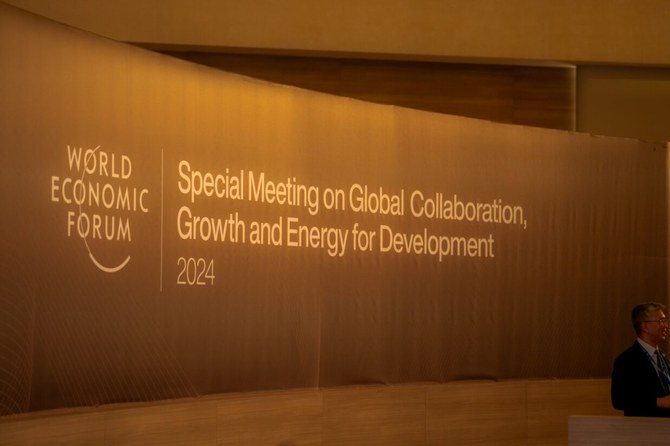
- Mohammed Al-Jadaan: Wars in Gaza, Ukraine ‘put a lot of pressure on economic emotion’
- Saudi Arabia’s ‘specific objective’ is to deescalate regional tensions, he tells World Economic Forum panel
RIYADH: Geopolitical threats such as the conflicts in Gaza and Ukraine pose the greatest risk to the global economy, Saudi Arabia’s finance minister has said.
Speaking in a panel discussion during the special two-day World Economic Forum meeting in Riyadh, Mohammed Al-Jadaan warned that the knock-on effects of conflict are “directly impacting economies.”
He said: “Geopolitical threats, which unfortunately are increasing instead of decreasing, are possibly the number one risk today if you look at the global economy at large. Geopolitical tensions bring other things that are directly impacting economies.”
Conflicts in Gaza, Ukraine and elsewhere “put a lot of pressure on economic emotion,” he added, describing economies as being “impacted by sentiments.”
Al-Jadaan said: “It is very unfortunate to see loss of lives. Civilian lives are important whether in Ukraine, or in Palestine.
“Cool-headed countries and leaders need to prevail; you need to make sure you deescalate.”
The Kingdom has exerted significant efforts in recent years to deescalate tensions in the Middle East, he added, describing the strategy as a “specific objective” of Saudi Arabia.
“The region needs to focus on its people, its growth and its economy, rather than focus on politics and conflict.”
The conflict in Gaza, which began following the Hamas-led assault on southern Israel on Oct. 7 last year, has resulted in the deaths of almost 35,000 Palestinians, mostly women and children.
Palestinian President Mahmoud Abbas, who took part in a separate panel at the meeting, said that “110,000 people have been killed or wounded in Gaza since Oct. 7 ” and that “75 percent of the territory” in the enclave has been destroyed by devastating Israeli military action.
“What happened in Gaza has not happened in Germany and other European countries during the Second World War,” he said, adding: “The fighting in Gaza must stop immediately and we warn against any plans for displacement.”
The Saudi finance minister warned that “geopolitical maneuvering,” including “fragmentation, protectionism and using the economy as a serious tool to achieve objectives in terms of limitations on trade and technology” could have adverse effects on global economic health.
“Policymakers need to be agile in dealing with these,” Al-Jadaan said.
Kristalina Georgieva, the managing director of the International Monetary Fund, described fragmentation in the world economy as “certainly bad for the prospect of growth.”
In the meeting’s opening panel, she said: “The immediate priorities for countries are to get inflation rates within targets; focus on rebuilding fiscal buffers and find ways to cooperate more.
In his comments to the panel, Al-Jadaan said: “In economic planning, it is OK to change … to adjust on new circumstances. And that to me is the advice I would give to everyone. You need a long-term plan, like Saudi Vision 2030, and doubling down on the implementation, but also you need to make sure you adjust.
“In the longer term, regardless of what is happening today, you need to focus on your own people, your human capital. This is the longer term play that is critical.
“I can say this: Saudi Arabia and the region has the means to do it, but there are a lot of countries who will find it difficult to provide quality education and quality healthcare for their people,” he said.
About 1,000 officials, experts and thought leaders from 92 countries are in Riyadh for the World Economic Forum’s Special Meeting on Global Collaboration, Growth and Energy for Development.
The event aims to “promote forward-thinking approaches to interconnected crises, while remaining realistic about shorter-term trade-offs” and “work to bridge the growing North-South divide on issues such as emerging economic policies, the energy transition and geopolitical shocks.”
Heba Ismail brings Saudi representation to NFT ecosystem
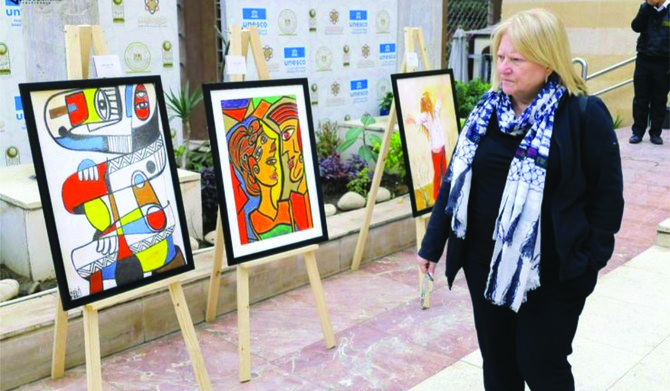
- Heba Ismail is highlighting ways for artists to flourish in the digital world
JEDDAH: Saudi artist Heba Ismail showcased her work at the Outer Edge Innovation Summit in Riyadh this week.
Commenting on her experience at the summit as one of the first Saudi artists to venture into the Web3 art scene, she said: “Having my paintings displayed on the event screens is a tremendous honor, offering global visibility and inspiring more Saudi and Arab artists to explore the diverse options available for sharing their art with the world.

“Through my participation with Nuqtah, the first Saudi NFT platform, I am eager to present my art on a global stage and connect with audiences in innovative ways,” she continued.
Non-fungible tokens — or NFTs — are, in this scenario, digital tokens that can be redeemed for a digital art work. Ismail is exploring their potential in the Saudi art scene.
HIGHLIGHTS
• With a professional background in dentistry, Heba Ismail found parallels between that meticulous work and her own creative process.
• Partnering with ChainVisory, a blockchain consultancy company, Ismail launched the Hebaism brand.
• It combines NFTs and original paintings, providing collectors with both digital and physical assets.
For Ismail, art has always been more than just a hobby — it’s been a lifelong calling. With a professional background in dentistry, Ismail found parallels between that meticulous work and her own creative process.

Inspired by movements including cubism, fauvism, and surrealism, Ismail’s art is a fusion of diverse influences and personal narratives “Each face represents a feeling and a vision documented on a painting. I paint poetry, and often times each piece is accompanied by a poem,” she said. “As a Saudi female, most of my paintings represent myself and my Saudi culture, which I am proud of. The characters are coded feelings, faces that tell a story — either joy, sadness, or acrimony.”

Her introduction to NFTs came in 2021, sparking a fascination with the technology and its potential. Partnering with ChainVisory, a blockchain consultancy company, Ismail launched her Hebaism brand, which combines NFTs and original paintings, providing collectors with both digital and physical assets.
As a female Saudi artist, I want to leave a mark and impact on every art platform, putting Saudi art on the map worldwide.
Heba Ismail, Saudi artist
“I wanted to keep the authentic classical painting process, yet the NFT world gave me a chance to meet and discover different ways to share my art and build a name and a brand,” she said. “It’s been an enlightening journey, uncovering the futuristic art process and connecting with a vibrant community through Web3.”
Ismail hopes to inspire other artists in the region to explore new avenues for artistic expression.
“As a female Saudi artist, I want to leave a mark and impact on every art platform, putting Saudi art on the map worldwide,” she said.

















